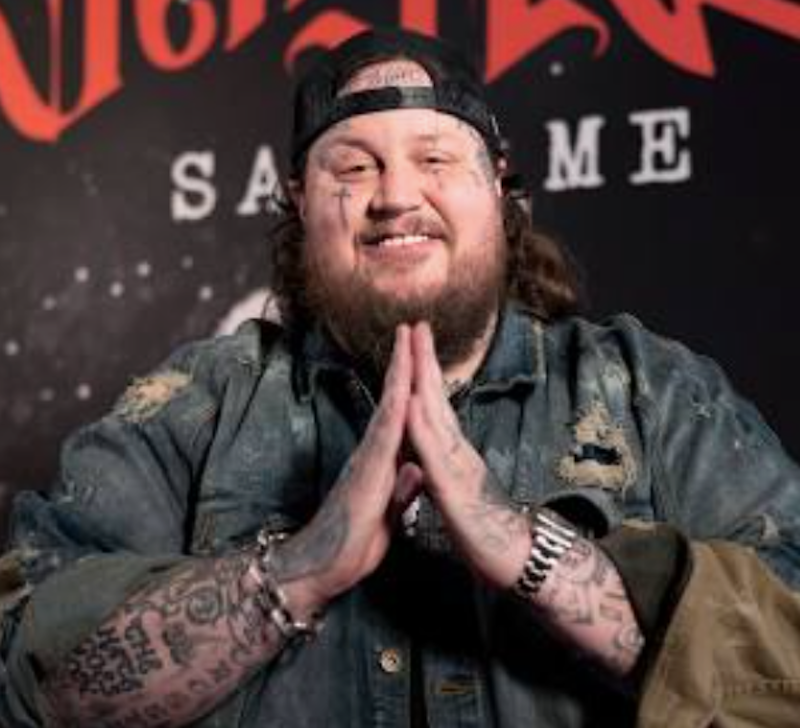The most conspicuous fact about American popular music, which has fueled the music and culture of the world for a century, is its racial syncretism, its hybrid vigor. Despite all of its and our problems, despite moments of raw appropriation and exploitation, our amazing musics are the best thing about us. There’s no better example of this than the current merger of country and hip-hop, well emblematized by the astonishing rise of the MC and singer Jelly Roll, and also by the multi-racial sexual sunburst known as Tanner Adell.
The merger of races in the American recording studio (Muscle Shoals, let's say) is a reprieve from the separation of the races in education or policing. It's an erotic and joyous site of merger, still. But long ago, the blues was a racially syncretic music (the harmonica came from Germany, for example). Country was. Jazz (I bet Armstrong's cornet was German too). Gospel. Rock 'n’ roll. Soul. No race can own a musical style, and in the US no race invents a musical style all by itself. All are assembled from pre-existing materials, instruments, harmonies, even if this particular one came together in this particular neighborhood.
The union of the races in American popular song is aesthetic, erotic and spiritual. We all know "Amazing Grace," for example. And we all like to watch people twerk. Or let's try this: for any American, there’s some sort of person whom they’d like to see twerk.
You’re not going to find a better example of the racial synthesis than the merger of country and hip-hop which has developed for more than a decade, and is now mature and ready to dominate everything. It took a long time to reach this point, because the styles and the cultures appear opposite, racially and thematically. But hip-hop artists appropriated and ridiculed country and western aesthetics from early on. And the country charts were experimenting, perhaps somewhat lamely, with electronic rhythm tracks and chanted vocals by the early-2010s.
Well underneath the charts, though, whole squads of country MCs were setting up shop. The style (country hip-hop) had listeners, and dedicated zones of social media and live performance, but it didn't produce many hits. But Gangstagrass gave the world the Justified theme. The country rapper Yelawolf was hanging out with Eminem and was part of a stable which included Struggle Jennings and the suddenly emblematic artist of now, Jelly Roll, who started out as a 100 percent rapper and is now an 85 percent singer. Lil Nas X's "Old Town Road" was the moment of takeover, when everyone seemed to realize that this makes sense.
Jimmie Rodgers and Robert Johnson were contemporaries, both blues artists, both from Mississippi. We might say something similar of Ray Charles and Johnny Cash, and Charles recorded classic country music and Cash played the blues.
Redneck rural culture and black inner-city culture have had a lot in common at any given moment, including drug problems, guns, evangelical Christianity, car culture, fried chicken, and a certain weakness for macho posturing. Not only that, but we've been merging in every possible way all this time even while the authorities are trying to keep us separate. "In every possible way" might take on a new meaning as you listen to the extremely female country hip-hop artist Tanner Adell weave a sexual scenario about herself and "fantasy Britney (Spears), circa 2005." ("Will she think that I'm weird when I ask for advice/How to get that glow in my skin, how to get my ass that tight.")
There haven't been that many female country rappers, at least not that I've seen, so Tanner, with her wild and wonderful and reprehensible EP "Buckle Bunny," is an event. What if Miranda Lambert and Megan Thee Stallion got lesbian-married? Their babies would look and sound like Tanner Adell. Can you be a country star who acts like Cardi B? Who's showing you her g-string and grabbing her own tits on the cover of her new record? Maybe yes, maybe no. But by all means, give it a shot.
I'm not regarding Tanner Adell as a mere novelty. She really can sound like Miranda, including the redneck feminism. Trailer Park Barbie ("redneck knockoff, yeah that's what they call me") is timely, and I want to mention that I've been looking for a trailer park Barbie, the realest Barbie, my whole life. One reason for this is that trailer park Barbie, unlike Barbie the bourgeois white girl, has a big bottom end. Suddenly, the whole history of country music sounds kind of thin, and Adell is thick. It's all about the bass, the bass that roars and rolls under this whole record. I picture it giving Jimmie Rodgers an orgasm.
Adell makes it obvious that there are still racial/aesthetic lines to cross and people are still crossing them. This is encouraging.
I wouldn't want country music to drop all the real drums, steel guitars, and fiddles in favor of building beats in software. But there’s no reason we can't do both, and we're seeing some of the reasons we might want to. As Adell instructs: just sit back and watch me bake it. WAP! that's country.
—Follow Crispin Sartwell on Twitter: @CrispinSartwell

